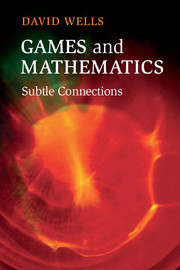Book contents
- Frontmatter
- Contents
- Acknowledgements
- Part I Mathematical Recreations and Abstract Games
- 1 Recreations from Euler to Lucas
- 2 Four abstract games
- 3 Mathematics and games: mysterious connections
- 4 Why chess is not mathematics
- 5 Proving versus checking
- Part II Mathematics: game-like, scientific and perceptual
- References
- Index
5 - Proving versus checking
Published online by Cambridge University Press: 05 November 2012
- Frontmatter
- Contents
- Acknowledgements
- Part I Mathematical Recreations and Abstract Games
- 1 Recreations from Euler to Lucas
- 2 Four abstract games
- 3 Mathematics and games: mysterious connections
- 4 Why chess is not mathematics
- 5 Proving versus checking
- Part II Mathematics: game-like, scientific and perceptual
- References
- Index
Summary
The solution to Euler's Bridges of Königsberg is as neat as it is simple but for that reason it is now little more than an historical curiosity, only suitable for elementary puzzle books and long since left behind by much more challenging topological problems.
The knight tours that Euler investigated have the advantage of often being ‘pretty’ and perhaps suggesting some underlying structure which, however, is very hard to find: so hard that they have not led, unlike the Bridges of Königsberg, to a flourishing field of mathematical research. They have usually been found by a combination of ingenuity, a certain amount of mathematical argument, and trial and error, often aided today by computers.
Such puzzles are typical of many mathematical recreations but not typical of mathematics as a whole, where we expect to do better than merely find a solution by trial and error or check results by brute force calculation. Indeed, we could say that several mathematical recreations remain so because they have not proved amenable to deeper analysis.
The limitations of mathematical recreations
Recreations tend to emphasise the synthetic construction of solutions, and proofs that show that constructions are adequate — for example, by displaying a set of pentominoes filling a certain shape — while deeper questions often seem impossible to answer. For example, what formula will predict the number of arrangements of the 12 pentominoes which will fill a rectangle 5m by n?
Information
- Type
- Chapter
- Information
- Games and MathematicsSubtle Connections, pp. 61 - 72Publisher: Cambridge University PressPrint publication year: 2012
